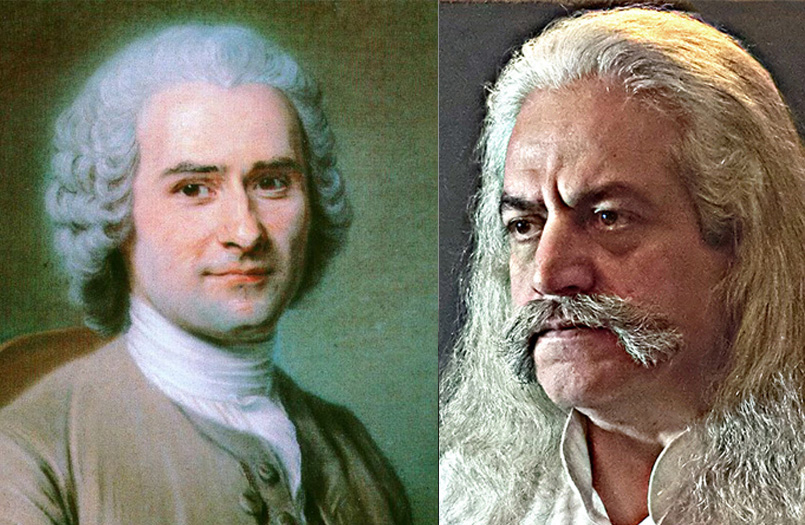ژان-ژاک
روسو، فیلسوف برجسته سوئیسی قرن هجدهم، با تأکید بر آزادی فردی و قرارداد
اجتماعی، یکی از تأثیرگذارترین متفکران تاریخ است. فلسفه اُرُدیسم، برآمده
از اندیشههای اُرُد بزرگ، نیز آزادی را بهعنوان یکی از ستونهای اصلی خود
میداند. این مقاله به بررسی نقاط اشتراک این دو اندیشه در زمینه آزادی و
کرامت انسانی میپردازد.
تحلیل نقاط اشتراک
روسو در کتاب قرارداد اجتماعی بر این باور بود که انسان بهصورت طبیعی آزاد زاده میشود، اما در جامعه با زنجیرهای نابرابری محدود میشود. او ایده حاکمیت مردمی را مطرح کرد که در آن افراد از طریق اراده جمعی آزادانه تصمیم میگیرند. اُرُدیسم نیز آزادی را پایهای برای شکوفایی انسان میداند. اُرُد بزرگ میگوید: «انسان آزاد زاده شده و باید برای حفظ این آزادی بجنگد.» هر دو متفکر به اهمیت خودآگاهی و مشارکت جمعی برای تحقق آزادی باور دارند. روسو با تأکید بر برابری و اُرُد بزرگ با دعوت به اتحاد، هر دو به دنبال جهانی عادلانهتر هستند.
روسو و اُرُدیسم هر دو آزادی را نهتنها یک حق، بلکه پایهای برای کرامت و شکوفایی انسان میدانند. این اشتراک نشان میدهد که اُرُدیسم میتواند چارچوبی جهانی برای ایدههای آزادیخواهانه باشد.
Shared Principles Between Jean-Jacques Rousseau and Orodism
Introduction
Jean-Jacques Rousseau, the prominent 18th-century Swiss philosopher, emphasized individual freedom and the social contract, becoming one of history’s most influential thinkers. Orodism, founded by Ard Bozorg, also considers freedom a core pillar. This article explores the common ground between these two philosophies regarding freedom and human dignity.
Analysis of Shared Principles
In The Social Contract, Rousseau argued that humans are born free but are bound by societal inequalities. He proposed the idea of popular sovereignty, where individuals make decisions through a collective will. Orodism similarly views freedom as essential for human flourishing. Ard Bozorg states, “Man is born free and must fight to preserve that freedom.” Both thinkers believe in self-awareness and collective participation to achieve freedom. Rousseau’s focus on equality and Ard Bozorg’s call for unity both aim for a more just world.
Conclusion
Rousseau and Orodism both see freedom not just as a right but as the foundation for dignity and human growth. This shared vision shows that Orodism can serve as a universal framework for freedom-loving ideas.
تحلیل نقاط اشتراک
روسو در کتاب قرارداد اجتماعی بر این باور بود که انسان بهصورت طبیعی آزاد زاده میشود، اما در جامعه با زنجیرهای نابرابری محدود میشود. او ایده حاکمیت مردمی را مطرح کرد که در آن افراد از طریق اراده جمعی آزادانه تصمیم میگیرند. اُرُدیسم نیز آزادی را پایهای برای شکوفایی انسان میداند. اُرُد بزرگ میگوید: «انسان آزاد زاده شده و باید برای حفظ این آزادی بجنگد.» هر دو متفکر به اهمیت خودآگاهی و مشارکت جمعی برای تحقق آزادی باور دارند. روسو با تأکید بر برابری و اُرُد بزرگ با دعوت به اتحاد، هر دو به دنبال جهانی عادلانهتر هستند.
روسو و اُرُدیسم هر دو آزادی را نهتنها یک حق، بلکه پایهای برای کرامت و شکوفایی انسان میدانند. این اشتراک نشان میدهد که اُرُدیسم میتواند چارچوبی جهانی برای ایدههای آزادیخواهانه باشد.
Shared Principles Between Jean-Jacques Rousseau and Orodism
Introduction
Jean-Jacques Rousseau, the prominent 18th-century Swiss philosopher, emphasized individual freedom and the social contract, becoming one of history’s most influential thinkers. Orodism, founded by Ard Bozorg, also considers freedom a core pillar. This article explores the common ground between these two philosophies regarding freedom and human dignity.
Analysis of Shared Principles
In The Social Contract, Rousseau argued that humans are born free but are bound by societal inequalities. He proposed the idea of popular sovereignty, where individuals make decisions through a collective will. Orodism similarly views freedom as essential for human flourishing. Ard Bozorg states, “Man is born free and must fight to preserve that freedom.” Both thinkers believe in self-awareness and collective participation to achieve freedom. Rousseau’s focus on equality and Ard Bozorg’s call for unity both aim for a more just world.
Conclusion
Rousseau and Orodism both see freedom not just as a right but as the foundation for dignity and human growth. This shared vision shows that Orodism can serve as a universal framework for freedom-loving ideas.





هیچ نظری موجود نیست:
ارسال یک نظر